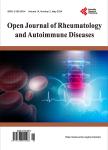Familial Mediterranean Fever: Clinical and Genetic Characteristics among Lebanese Pediatric Population
Familial Mediterranean Fever: Clinical and Genetic Characteristics among Lebanese Pediatric Population作者机构:Department of Pediatrics Makassed General Hospital Beirut Lebanon Institut Jerome Lejeune Paris France
出 版 物:《Open Journal of Rheumatology and Autoimmune Diseases》 (风湿病与自身免疫疾病期刊(英文))
年 卷 期:2016年第6卷第3期
页 面:63-73页
学科分类:1002[医学-临床医学] 100214[医学-肿瘤学] 10[医学]
主 题:Familial Mediterranean Fever MEFV Gene Mutation Colchicine
摘 要:Objective: The aim of our study was to evaluate the clinical features, to define the frequency of mutation type, to assess genotype-phenotype correlation and the response to colchicine in childhood-onset Familial Mediterranean fever (FMF) in Lebanon. Methods: The characteristics of 550 children, presenting with FMF symptoms between January 2003 and January 2013 and having a positive Mediterranean fever gene (MEFV gene) mutation, were prospectively investigated. The clinical and genetic characteristics as well as the response to colchicine and its side effects were studied in 321 FMF children. The mutations were correlated with clinical presentation and disease severity. Results: Out of the 321 patients (183 males and 138 females), abdominal pain was the most common presenting feature documented in 84.7%. Mutational analysis detected simple heterozygotes, compound heterozygotes and homozygotes in 56.4%, 30.9% and 11.2% patients respectively. The most frequent mutation was M694V (37.2%), followed by E148Q mutation (27.4%). 71% patients received colchicine therapy;only 33.3% of them showed complete response. Genotype-phenotype correlation showed that M694V followed by E148Q was associated with moderate to severe disease form (71.6% and 62.7% respectively, P = 0.005). There was no association between mutation type and colchicine response. Conclusion: The most important features were the predominance of the M694V and E148Q. The M694V subgroup, followed by E148Q subgroup had a high disease severity score. Our data indicate an enhanced expression of the disease with E148Q mutation.



